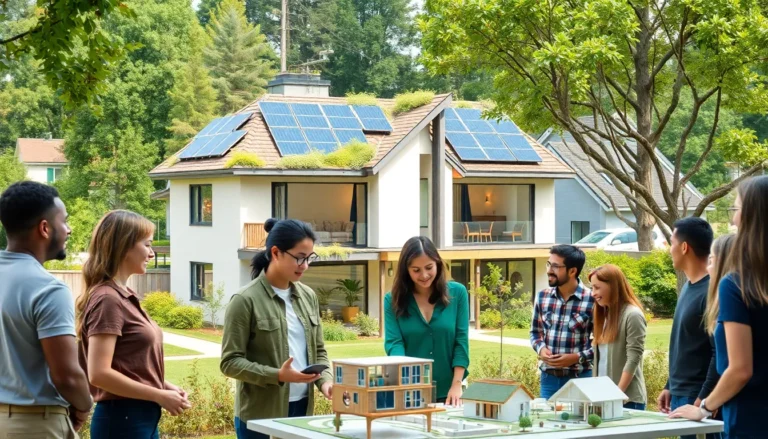Table of Contents
TogglePortland’s real estate market is like that quirky friend who always keeps you guessing. One minute, it’s a hotbed of activity, and the next, it’s a calm oasis of opportunity. With its stunning landscapes and vibrant culture, it’s no wonder people are flocking to the City of Roses. But what’s really happening beneath the surface?
Overview of Portland Real Estate Trends
Portland’s real estate landscape remains dynamic and multifaceted. Properties in desirable neighborhoods appreciate steadily, driven by demand from new residents. Significant factors influencing market activity include low inventory levels and high buyer interest.
Home prices reflect this competitive environment, with median home values showing an upward trajectory. For instance, the Portland metro area reported a 10% increase in median home prices year-over-year, reaching approximately $550,000. These statistics indicate the urgency felt among buyers in a rapidly changing market.
Condos and townhomes also attract attention, especially appealing to urban professionals seeking proximity to amenities. The need for more affordable housing options continues to motivate developers to explore creative solutions. Mixed-use developments featuring residential, retail, and communal spaces gain popularity, enhancing the urban experience.
Rental markets also experience pressure, characterized by rising rents that impact affordability. Average rent for a two-bedroom apartment now approaches $2,000, reflecting increased demand for rental units. Renters face competition as potential buyers tread carefully, weighing the benefits of homeownership against current market conditions.
Government policies and interest rates carry substantial weight in shaping the overall market dynamics. Recent adjustments in interest rates influence mortgage affordability, thus affecting buyer behavior. Close examination of these trends offers valuable insights into the future of Portland’s evolving real estate landscape.
Current Market Conditions

Portland’s real estate market is characterized by unique dynamics influenced by factors like inventory levels and home pricing.
Housing Inventory Levels
Low housing inventory levels create a competitive environment in Portland. Limited listings lead to increased buyer competition, driving up demand for available homes. Many prospective buyers encounter frustration due to the scarcity of properties. Active listings hover under a two-month supply, indicating a pronounced imbalance between supply and demand. Neighborhoods with desirable amenities attract numerous inquiries, especially from newcomers. This trend enforces the need for innovative housing solutions, such as mixed-use developments that address both residential and commercial needs.
Average Home Prices
Average home prices in Portland demonstrate a consistent upward trajectory. The median price for homes reached approximately $550,000, reflecting a 10% year-over-year increase. Buyers often find that property values in sought-after neighborhoods appreciate quickly. Luxury homes and new construction projects contribute to significant price growth, with urban areas experiencing faster appreciation. With average rents nearing $2,000 for two-bedroom apartments, affordability remains a central concern for many residents. Interest rates and government policies further impact buyer behavior, thereby shaping overall market trends.
Regional Influences on Real Estate
Various regional influences significantly shape Portland’s real estate market. Economic conditions and demographic changes actively contribute to market dynamics.
Economic Factors
Employment opportunities drive demand in the Portland area. Local industries like technology, healthcare, and manufacturing create jobs and attract talent. According to recent reports, the unemployment rate remains low, encouraging consumer confidence in housing investments. Low mortgage interest rates have also spurred demand, leading buyers to act quickly in a competitive market. Furthermore, rising wages enhance purchasing power, making homeownership more attainable. Real estate developers respond to these market pressures by increasing inventory through new construction projects. Such economic factors continuously influence the upward trajectory of home prices, with the median price now around $550,000.
Population Growth and Demographics
Portland’s population consistently grows, fostering high demand for housing. The metro area welcomed about 1.5 million residents, with significant migration from other states. Young professionals, families, and retirees are among the demographics relocating to the city. Diverse cultural opportunities and appealing neighborhoods drive this growth, further enhancing the local real estate market. With a focus on sustainability, many newcomers seek eco-friendly housing options, increasing interest in mixed-use developments. As a result of these demographic shifts, property values in sought-after neighborhoods appreciate steadily. This evolving landscape creates both challenges and opportunities for buyers and developers alike.
Future Projections for Portland Real Estate
Portland’s real estate market will see significant changes influenced by current trends and economic factors.
Expected Market Shifts
Local economic conditions will drive anticipated market shifts. Employment growth in various sectors will attract more buyers, raising demand. Population growth continues to add pressure on housing inventory, which remains low. Buyers increasingly seek properties with eco-friendly features, responding to a growing awareness of sustainability. Increased construction of mixed-use developments accommodates changing demographic preferences. Mortgage affordability will fluctuate with interest rates, directly impacting purchasing power. As property values continue to rise, competitive bidding could become more common, leading to potential market volatility in the coming years.
Investment Opportunities
Real estate investments in Portland hold promising potential. Upcoming developments in neighborhoods with high growth projections attract investors. Areas near public transit and job centers typically present lucrative prospects. Investing in multifamily units offers opportunities in a tight rental market while leveraging escalating demand. Additionally, eco-friendly property investments align with market preferences for sustainable living. Investors should closely monitor government policies that support housing development, as incentives may enhance profitability. Capitalizing on these emerging trends can yield substantial returns for proactive investors in Portland’s evolving landscape.
Portland’s real estate market continues to evolve in response to a mix of demographic shifts and economic factors. The steady rise in home prices and the competitive environment highlight the city’s strong appeal to newcomers. As demand for eco-friendly and mixed-use developments grows, investors have promising opportunities to explore.
The ongoing pressures of low inventory and high buyer interest suggest that the market will remain dynamic in the near future. Staying informed about these trends is crucial for prospective buyers and investors looking to navigate this vibrant landscape effectively.




